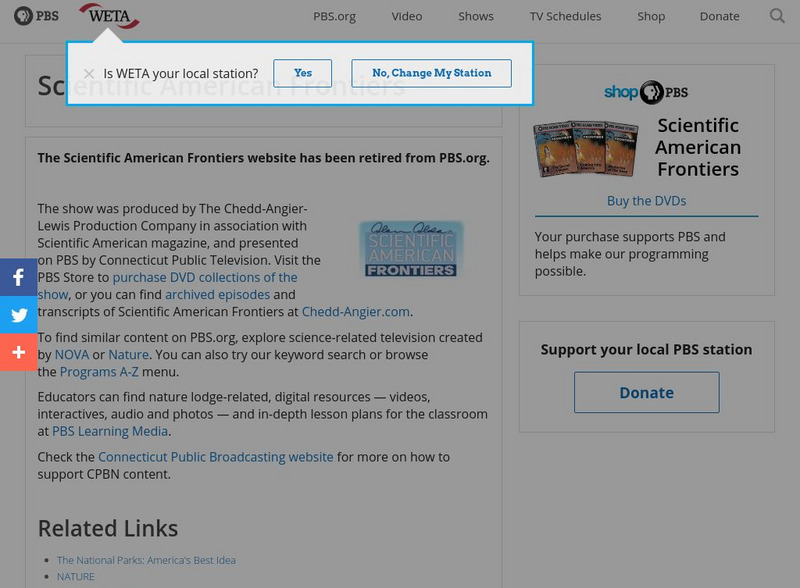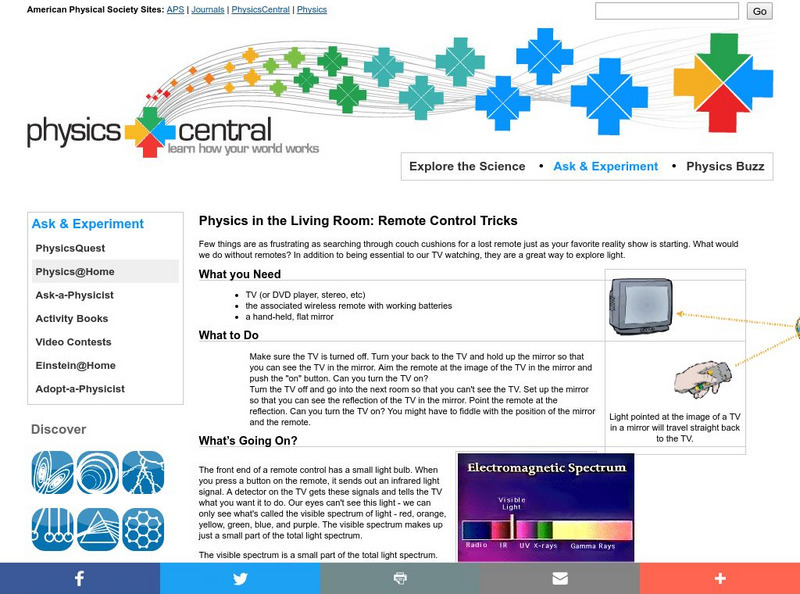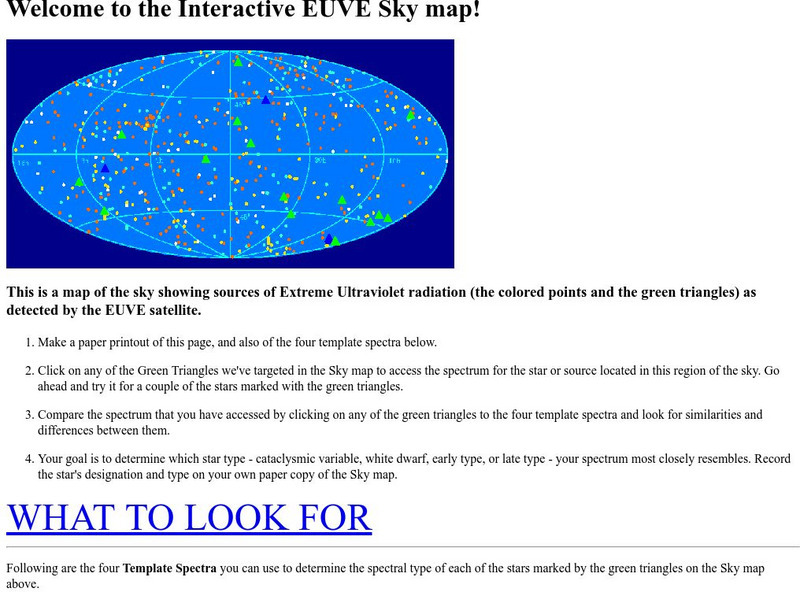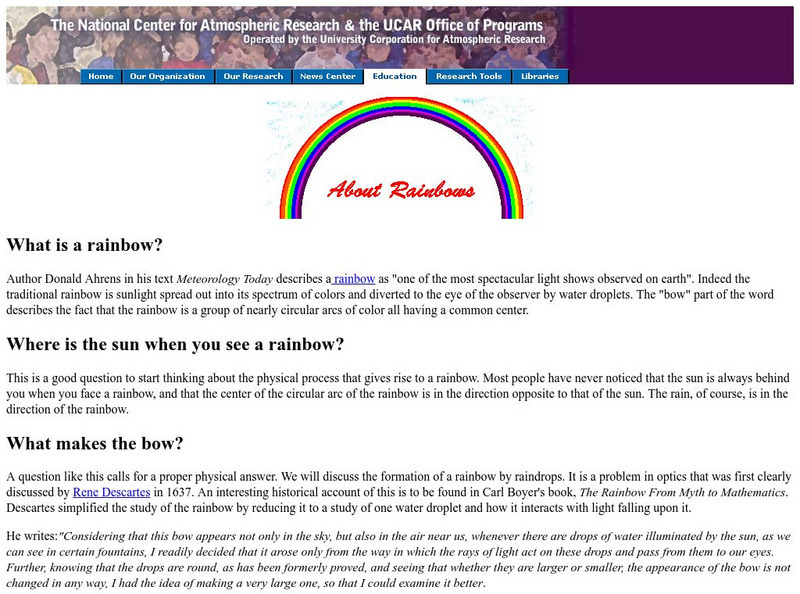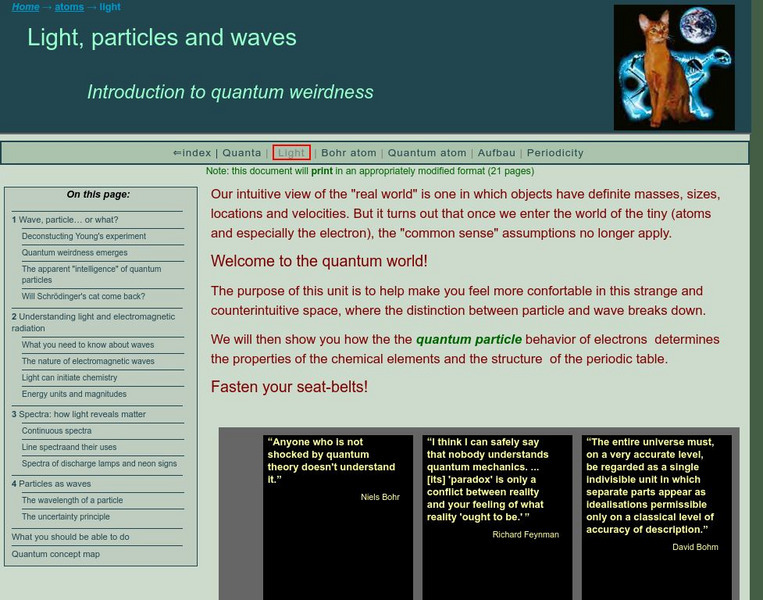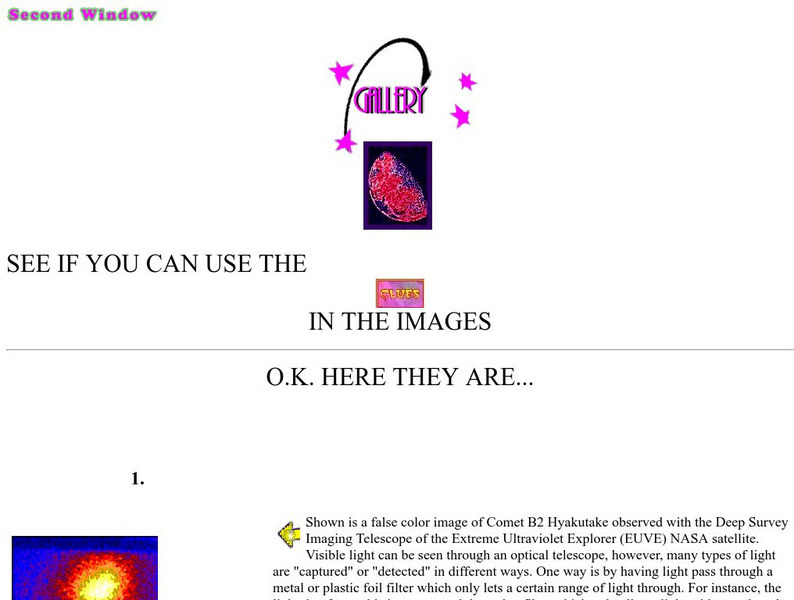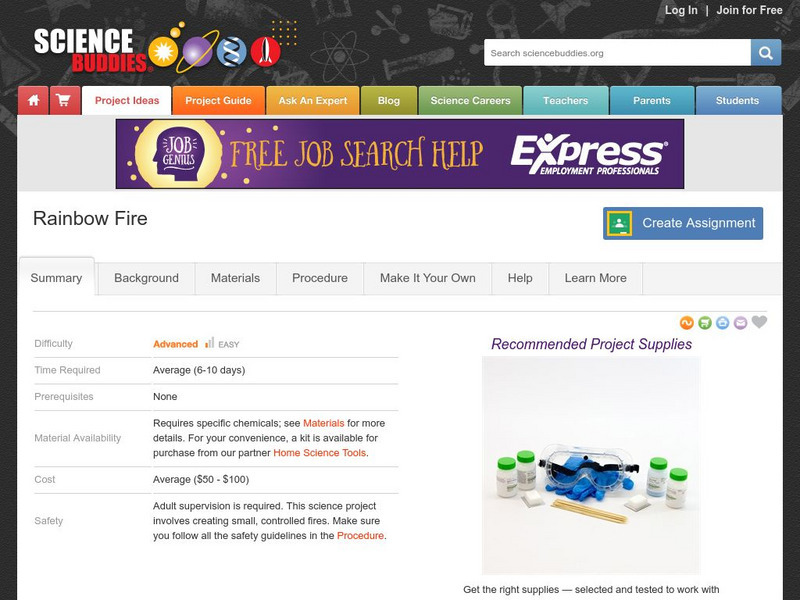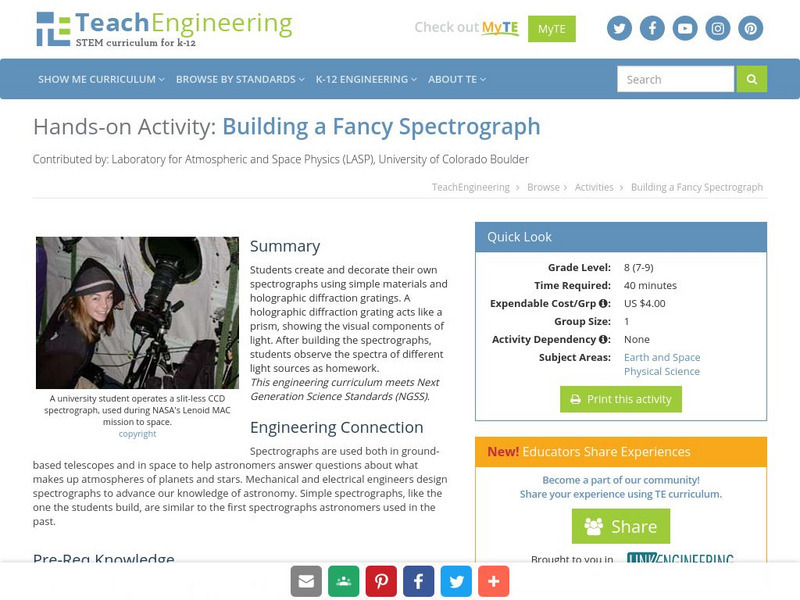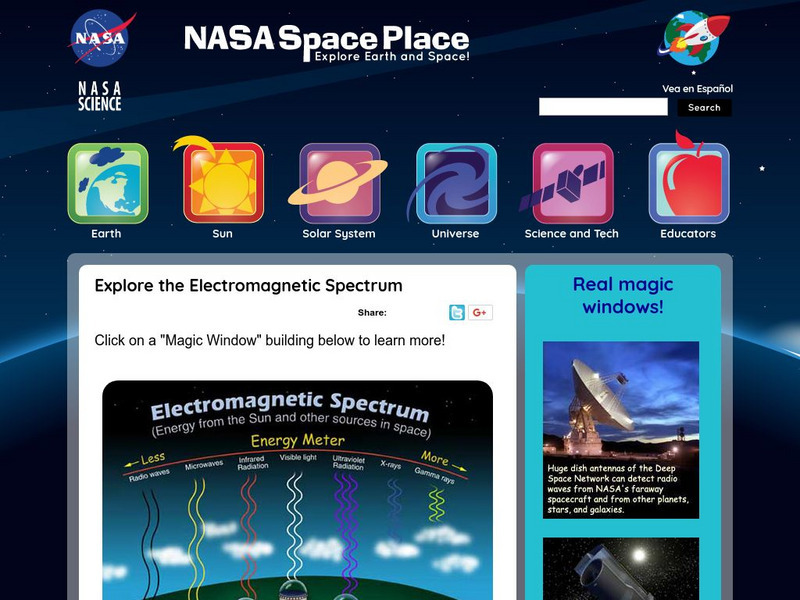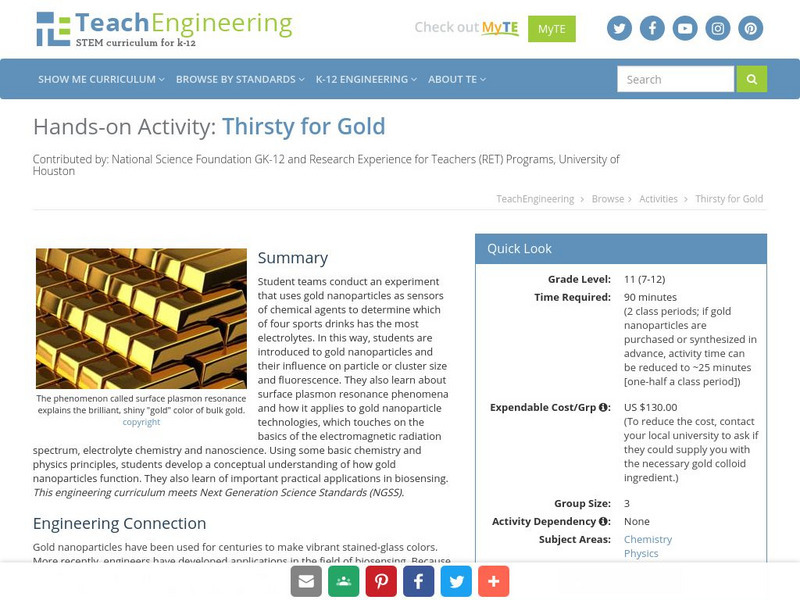Sophia Learning
Sophia: Radiation and Energy: Lesson 2
This lesson discusses the light spectrum and its influence on living things. It is 2 of 3 in the series titled "Radiation and Energy."
PBS
Pbs Teachers: Life's Big Questions: How Did the Universe Begin?
Investigate the Big Bang Theory of the origin of the universe by researching the light spectrum and the actions of light waves. Create models that illustrate red shift in a moving star and the expansion of the universe.
Science Struck
Science Struck: Visible Color Spectrum Wheel
A brief explanation of the visible color wheel.
Science Education Resource Center at Carleton College
Serc: Mn Step: Why Is the Sky Blue?
Students will learn about refraction and the scattering of sunlight as it enters the atmosphere, which causes the colors in light to separate, giving us blue skies and colorful sunrises and sunsets.
Optical Society
Optical Society of America: Optics for Kids: Release the Rainbow
A simple activity to demonstrate how light separates into colors when it passes through water acting as a prism.
Physics Central
Physics Central: Physics in the Living Room: Remote Control Tricks
An easy experiment through which students learn about light rays and the electromagnetic spectrum. Requires a TV, its remote, and a hand-held, flat mirror.
University of California
Interactive Extreme Ultraviolet Skymap
A map showing a view of the night sky is given; sources of extreme ultraviolet light are marked. Visitors analyze the spectrum from these parts of the sky and attempt to determine which star type the spectrum most closely resembles.
My Science Site
Optics: Energy and Control [Pdf]
A very comprehensive unit including topics such as light and its source, visible sources of light, transparency of objects and much more. Also offers a resource list, blackline masters, and expectation list, expectation summary and a...
TED Talks
Ted: Ted Ed: Light Waves, Visible and Invisible
Lucianne Walkowicz shows us the waves just beyond our perception: microwaves, radio waves, x-rays and more. [5:58]
University Corporation for Atmospheric Research
Ucar: About Rainbows
This site from the University Corporation of Atmospheric Research provides an illustrated article about the phenomenon of rainbows.
Science Made Simple
Science Made Simple: Why Is the Sky Blue?
This website has three different projects from which to choose on the topic of why the sky is blue. Also, you can scroll up to learn more about why the sky is blue.
Simon Fraser University
Chem1 Virtual Textbook: Spectra and Interaction of Light and Matter
Acting as a subtopic of the General Chemistry Virtual Textbook's section on Atoms and the Periodic Table, this site discusses continuous spectra and line spectra using examples and charts to assist in the understanding.
Physics Classroom
The Physics Classroom: Refraction and the Ray Model of Light: Rainbow Formation
Understand the physics behind Roy G. Biv, and how rainbows are formed by drawing upon our understanding of refraction, internal reflection, and dispersion.
University of California
Center for Science Education: Gallery
A gallery of astronomy images which depict galaxies, comets, the moon, planets, nebulae, supernovae as seen in various regions of the electromagnetic spectrum. Each image in the gallery is described. Fascinating!
Science Buddies
Science Buddies: Rainbow Fire
Astronomers can determine the atomic composition of distant stars by measuring the spectrum of light emitted by the star. Sound cool? Well in this project you can do something similar by observing the color of flames when various...
University of Colorado
University of Colorado: Physics 2000: Spectral Lines
Several pages from an excellent site which describe the science of spectroscopy. The unique atomic emission (and absorption) line spectrum of elements are illustrated and explained. Includes a Java applet depicting the quantum energy...
TeachEngineering
Teach Engineering: Building a Fancy Spectrograph
Students create and decorate their own spectrographs using simple materials and holographic diffraction gratings. A holographic diffraction grating acts like a prism, showing the visual components of light. After building the...
Exploratorium
Exploratorium: How to Build a Spectroscope
Instructions for how to construct a spectroscope from basic materials, which can be used to study colors produced by light from different sources. Adult supervision may be required for the use of the utility knife. Includes an...
TeachEngineering
Teach Engineering: Rgb to Hex Conversion
Students practice converting between RGB and hexadecimal (hex) formats. They learn about mixing primary colors in order to get the full spectrum of colors and how to average pixel values.
Curated OER
Georgia State University: Color
This site from Georgia State University discusses the location of visible light on the electromagnetic spectrum. Includes the wavelength values for various colors of light within the visible light spectrum.
NASA
Nasa's the Space Place: A Trip to the Land of the Magic Windows
Explore the electromagnetic spectrum and learn about each type of energy on the spectrum.
TeachEngineering
Teach Engineering: Waves: The Three Color Mystery
Students are presented with a challenge question concerning color blindness and asked to use engineering principles to design devices to help people who are color blind. Using the legacy cycle as a model, this unit is comprised of five...
TeachEngineering
Teach Engineering: The Three Color Mystery
Students are introduced to an engineering challenge in which they are given a job assignment to separate three types of apples. However, they are unable to see the color differences between the apples, and as a result, they must think as...
TeachEngineering
Teach Engineering: Thirsty for Gold
Student teams conduct an experiment that uses gold nanoparticles as sensors of chemical agents to determine which of four sports drinks has the most electrolytes. In this way, students are introduced to gold nanoparticles and their...
Other popular searches
- Visible Light Spectrum
- Light Spectrum Stars
- Light Spectrum Waves
- Light Spectrum Activity
- Light Spectrum and Colors
- Light Spectrum and Waves
- Newton's Light Spectrum
- Light Spectrum \ Stars
- Spectrum of Light
- Spectrum Light



